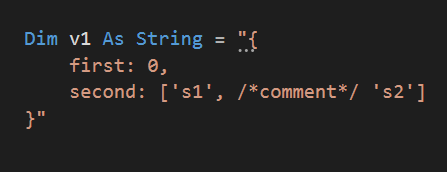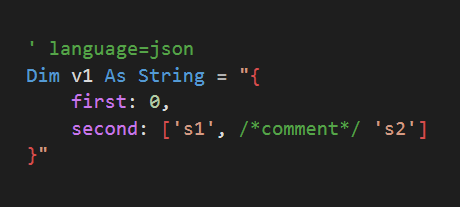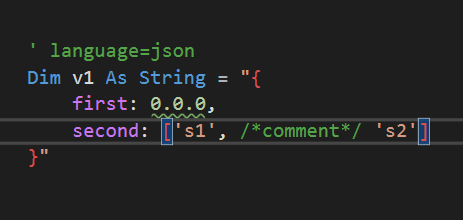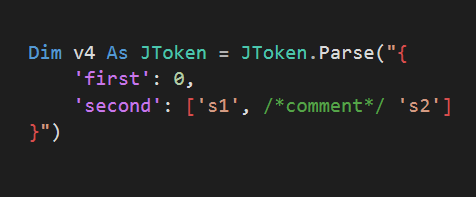User-defined string literal formats #2264
Replies: 14 comments
-
|
VS2019 has syntax highlighting for JSON strings (as well as Regex strings) in the box now, so this proposal seems superfluous. |
Beta Was this translation helpful? Give feedback.
-
|
@Joe4evr this proposal does not seem to be around syntax highlighting only. For the parsing part though you can use using Newtonsoft.Json.Linq;
public static class Extension {
public static JObject json(string str) => JObject.parse(str);
}using static Extension;
...
JObject obj = json(@"
{
a: 'Hi',
wow: [
'A string',
10
]
}");So you would save two characters for the price of making a non-constant expression look like a constant one. |
Beta Was this translation helpful? Give feedback.
-
|
A clever editor should also be able to do syntax higlighting from static if you add an attribute: To my knowledge ther is no such attribute for json yet but ReSharper has RegexPatternAttribute for regex |
Beta Was this translation helpful? Give feedback.
-
|
Edit: Another comment was posted while I was writing this, so this is a rough response to the two comments above the previous one. However, it would also allow people to do things like this without needing to create a language change for every new string literal prefix: public static class Extension {
[UserDefinedStringLiteral("b")]
public static byte[] Id(this byte[] bytes){
return bytes;
}
}
b"Hello, World!"
// new byte[]{(byte)'H', (byte)'e', (byte)'l', (byte)'l', (byte)'o', (byte)',', (byte)' ', (byte)'W', (byte)'o', (byte)'r', (byte)'l', (byte)'d', (byte)'!'}And it also, as a practical example, allows someone to create some kind of React-like library without needing to fork and edit the language itself, and with as little of an extra syntax footprint as possible to avoid detracting from the readability of the XML: [UserDefinedStringLiteral("html")]
public static ReactyElement ToReacty(this string xmlString){
return Reacty.toReactyObject(xmlString); // I have to imagine it would be more complicated than this, but I'm not going to write a bunch of code surrounding a library that doesn't exist yet.
}
string text = "Hello, World!";
ReactyElement boldText = html$"<b>{text}</b>"; |
Beta Was this translation helpful? Give feedback.
-
This work has already been done, without the need for any langauge changes here: dotnet/roslyn#25518 Examples of what it looks like are here: dotnet/roslyn#24110 |
Beta Was this translation helpful? Give feedback.
-
|
I don't understand how this example works at all: public static class Extension {
[UserDefinedStringLiteral("b")]
public static byte[] Id(this byte[] bytes){
return bytes;
}
}
b"Hello, World!"What actually is the compiler doing here? how is it making |
Beta Was this translation helpful? Give feedback.
-
|
@CyrusNajmabadi It would just read the bytes between the quotes rather than even making a string in the first place. Edit: In the case of string interpolation, the string would be converted into a byte array through UTF16. |
Beta Was this translation helpful? Give feedback.
-
[UserDefinedStringLiteral("html")]
public static ReactyElement ToReacty(this string xmlString){
return Reacty.toReactyObject(xmlString); // I have to imagine it would be more complicated than this, but I'm not going to write a bunch of code surrounding a library that doesn't exist yet.
}
string text = "Hello, World!";
ReactyElement boldText = html$"<b>{text}</b>";Note that this sort of thing is very challenging on the IDE side. For example, what if 'text' inside This is why, for example we don't support regex-highlighting on an interpolated string. if you have |
Beta Was this translation helpful? Give feedback.
-
I don't know waht that means. What bytes between the quotes? The language doesn't have a concept of that. A string is not built of bytes. It's possible you could say that a prefixed-string could be passed to a |
Beta Was this translation helpful? Give feedback.
-
|
@CyrusNajmabadi The actual bytes stored in the source file, unless for some reason that would be untenable. Edit: I concede that my "Hello, World!" example would only work if the source file were UTF8 or ASCII-encoded. |
Beta Was this translation helpful? Give feedback.
-
|
Beta Was this translation helpful? Give feedback.
-
That feels like that would be untenable. It would make the C# language change meaning depend on how the file was saved. Right now the language is completely agnostic to that. Heck, Roslyn doesn't even have the concept of files. You may be given "files" that have no backing on disk at all. It's unclear how that would even work here. |
Beta Was this translation helpful? Give feedback.
-
If you have a string,
|
Beta Was this translation helpful? Give feedback.
-
|
@Joe4evr Right. I could envision it being any type that had an How this would be defined at a language level is flexible to me. Perhaps it might literally be
|
Beta Was this translation helpful? Give feedback.





Uh oh!
There was an error while loading. Please reload this page.
Uh oh!
There was an error while loading. Please reload this page.
-
This proposal would allow for users to define their own string literal formats in a similar form to extension methods. For example:
A smart editor would be able to recognize these custom formats and provide syntax highlighting and code suggestions for other languages (of all kinds) within native C#. This could also allow for things like utf8 strings to be implemented in the standard library rather as a special language feature.
An alternative to double quotes could be backticks, if for some reason using double quotes in this context would be a breaking change.
Beta Was this translation helpful? Give feedback.
All reactions